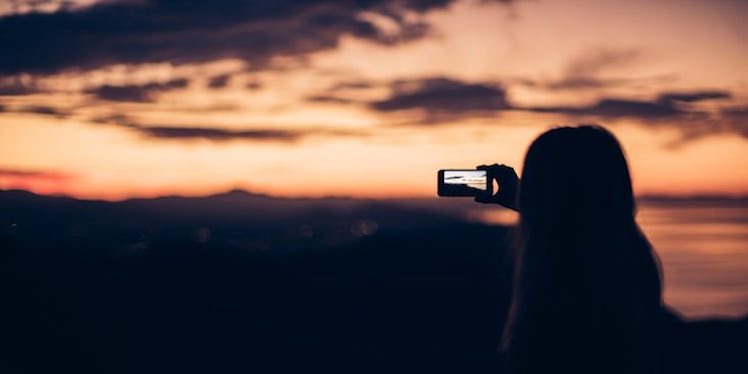
Can You Watch The Solar Eclipse Through Your Phone Camera? Here's What You Should Know
If you don't get a snapshot of the solar eclipse, can you really say you watched it? While using smartphones as a primary means of eye protection during the historic event is ill-advised, as long as you're not pointing the lens directly towards the sun, Apple gave us the go-ahead to view the solar eclipse through phone cameras. So don't worry, you can get that perfect Insta-shot.
I think we all know by now that the millennial generation has zero shame in their selfie game, and while I understand that itching desire to do it for the 'gram, cautionary measures should be taken no matter how you view and capture this Kodak moment. Otherwise, the effects can be brutal.
Marilyn Gordon, medical director for United Healthcare of New Jersey, told NJ.com what can really happen to eyes if they are exposed to UV rays without proper protection.
Short-term issues can include solar keratitis, which is similar to a sunburn of the cornea (the front part of the eye), Gordon says. This can cause eye pain and light sensitivity, with symptoms often occurring within 24 hours after exposure. Long-term issues can include solar retinopathy, which is when the sun burns a hole in the retinal tissues, usually occurring at the fovea. This can cause loss of central vision, with symptoms occurring immediately to two weeks after exposure. Depending on the severity of the retinopathy, vision problems can last for months or be permanent.
Solar eclipse or not, you don't want to risk exposing the naked eye to sun rays. To avoid risk of irreversible damage for the sake of an Instagram photo, here are a few tips on how to use your smartphone to view and document a total or partial eclipse this afternoon and onwards.
First things first, you still need to wear ISO-certified eclipse glasses.
If you're lucky enough to reside in any of the 12 states experiencing totality this afternoon, there's a tiny window of opportunity (two minutes or so) where it will be safe to look directly at the moon blocking the sun.
Unfortunately for those not on the nature-made VIP viewers list, the rest of us will only experience a partial eclipse, meaning solar eclipse viewer glasses are necessary if you plan on watching the solar eclipse from your front lawn.
Next, focus on the phone's screen, and do not look through its viewfinder.
Now that we've got eyewear under control, let's direct our attention to our smartphones. To summarize an otherwise lengthy response, you can watch the solar eclipse on your phone camera, but there are rules.
The most important thing is to resist all temptation to look through the device's viewfinder. Optometrist Kelly O'Shea told CBS News that by doing this, "you are actually concentrating all that light onto your macula and really create a burn in the back of your eye." Instead, focus your attention on the phone's wide screen, and record the event on high resolution.
If you just have to have a close-up of the ordeal, and downloading a Google image after the fact won't suffice, cover the camera lens with a solar filter to protect your device and, more importantly, your eyesight.
Don't forget to shut off the flash.
I know myself, and oftentimes I forget flash is still a thing, but it is and it's super important to remember to switch flash settings to off when snapping selfies with a solar eclipse.
Telegraph UK reports that flash and autofocus are a solar nightmare. The bright light from your device is not only a surefire way to ruin your shot, it can also do a number on your night vision and negatively affect the experience of those around you.
And, if you have one, consider using a tripod to capture the moment instead.
Millennials are addicted to their phones, and while I'm all for documenting history, there are some things that should be experienced outside of the lens.
To get the best of both worlds here, balance your phone on top of a tripod in order to witness science in all its glory with the added benefit of capturing it all on film.